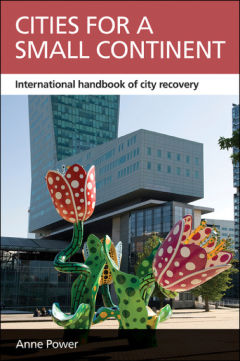David Towell reviews this detailed study of seven cities that have experienced major decline, recovery and new challenges in the age of austerity.
Authors: Anne Power with Bruce Katz
Reviewed by: David Towell
The Centre for Inclusive Futures defines its mission as 'developing sustainable communities that include everyone as equal citizens'. Towns and cities, where increasingly most of us live, are a key focus for this endeavour.

Cities are important to our identities, they are part of who we are. Typically they have democratic governance and are powerful enough at least to mediate the global forces which shape environment, economy and society. Through place-based leadership, they can address contemporary challenges with real people in mind.
Robin Hambleton's excellent study, Leading the Inclusive City (2015), offers a textbook analysis of what such leadership involves, drawing on experience from 17 big cities across the world. This new book from Anne Power and her associates provides a valuable sequel to this analysis in which the 'small continent' is Europe. Their focus is detailed study of seven cities which all emerged as big industrial centres in the 19th Century but have since seen major decline, recovery and new challenges in the age of austerity. The cities include Belfast and Sheffield in the UK but also Bilbao, Leipzig, Lille, Saint-Etienne and Torino in different parts of the continent. As the sub-title suggests, the aim of Cities For A Small Continent is to document and learn from their experience so as to inform further city renewal which also meets the urgent need to tackle climate change.
Over the long sweep of the last Century and more, the book identifies three main phases in the growth and decline of these cities. They grew rapidly as industrial cities because of location (as ports and trading centres) and/or proximity to natural resources (coal and iron). Booming economies and massive population growth characterised their success, sustained in the post-war period through Keynesian economic policies, public investment (e.g. in mass housing) and welfare provision. But this wasn't to last as traditional industries declined and past excess led to massive environmental damage, as well as the social challenges associated with unemployment and run-down communities. The second phase, perhaps from the mid-70s onwards, sought to respond to these challenges. Governments, including the European Union, led efforts to restore inner city assets, improve public transport and invest in neighbourhood renewal; public investment leveraged back the private sector, especially through innovative small and medium sized enterprises which could exploit technical skills and applied research capabilities; environmental decay was tackled through 'greening' cities and land-mark projects (in Belfast, the conversion of the Titanic dock into a science park; in Bilbao, the Guggenheim gallery) symbolised a new civic confidence.
But of course, problems remained, for example unemployment among those whose skills least fitted the new industries, and much of this endured a major set-back from the global financial crisis in 2008 and the age of austerity that has followed. The third phase, into the present, has been about managing these challenges, including the over-arching threats from climate change, through new, leaner methods which prioritise civic partnerships, 'green' innovation and community initiatives.
How the next phase of city recovery turns out is, of course, uncertain. It will clearly depend both on macro-political (e.g. the extent of devolution to cities and city regions) and macro-economic (e.g. the depth of continuing resource constraints) policies. However, drawing lessons from the recent history of these cities, Power sets out a framework for future progress focused on five interconnected strategic priorities.
Based on strong civic traditions, cities require 'hands on' public leadership, working in partnership with private and community interests to generate a patchwork quilt of adaptive innovations. One part of this needs to be continuing efforts to make the urban landscape more attractive through restoring city centres, upgrading public transport and improving decaying housing estates.
Within this positive governance climate and with creative inputs from technical universities, a strong private sector (especially SMEs) is required to drive progress towards a new, low carbon industrial economy - finding new uses for old assets and achieving breakthroughs in advanced manufacturing which meet contemporary needs e.g. for renewable energy.
In turn, public, private and community action is required to make the radical shift to 'green growth' and protect the environment, for example through preventing urban sprawl, expanding green spaces, promoting cycle use, growing food locally and developing eco-neighbourhoods.
Perhaps most important, city leaderships need to address the implications of urban change for their populations, responding to huge inequalities and attending to the people who have become marginalised, e.g. through the loss of traditional employment. The requirements here include investment in skills development and job finding initiatives, neighbourhood renewal and support for community initiatives, for example, to ensure that no-one goes hungry (shocking though it may be to have to say this in 2016).
Cities For A Small Continent offers an optimistic vision (although it might be rather less optimistic following the UK's 'Brexit' vote). Industrial cities of the past can rise, Phoenix-like, through recovery and reinvention to create a more sustainable and inclusive future. But despite the achievements detailed in this book, this remains a massive challenge.
The publisher is Policy Press.
Cities For A Small Continent © Policy Press 2016.
Review: Cities For A Small Continent © David Towell 2016.
All Rights Reserved. No part of this paper may be reproduced in any form without permission from the publisher except for the quotation of brief passages in reviews.